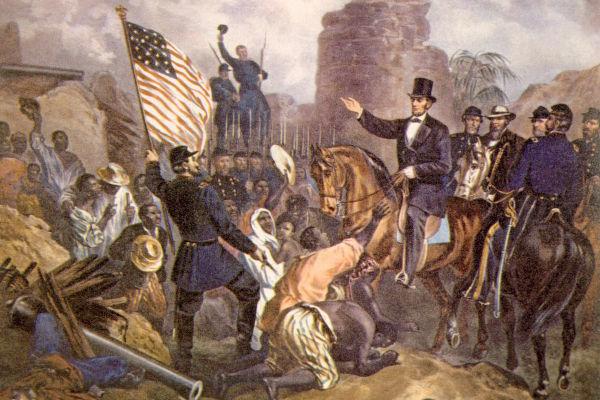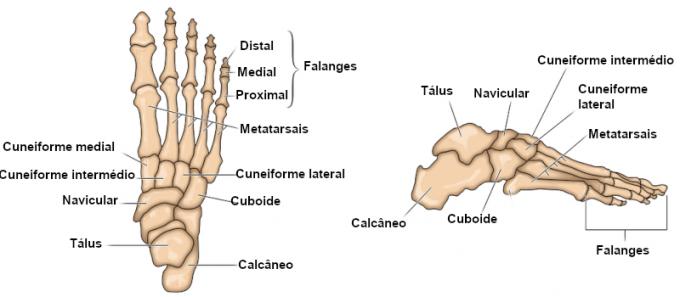AbrahamLincoln he was the 16th US president, ruling from 1861 to 1865. It was during his administration that the American Civil War occurred, a conflict caused by the refusal of Lincoln's victory by the southern states in the presidential election of 1860. Lincoln was also branded as the president who decreed the emancipation of African Americans in the United States.
Accessalso: What events marked the United States during the 19th century?
First years
Abraham Lincoln born in the dayFebruary 12, 1809, on a farm near the city of Hodgenville, in the state of Kentucky, United States. He was one of three children born to Thomas Lincoln and Nancy Hawks Lincoln. Abraham's brothers were named Sarah and Thomas—he died in infancy.

THE Lincoln family owned some land in Kentucky, from which he drew his livelihood, but problems over possession of them led Thomas to lose them to the state. For this reason, the family moved to Indiana in 1816, and there Thomas held different jobs as a way to support his family.
Lincoln's family took a heavy toll when Nancy Lincoln, Abraham's mother, passed away, in 1818. It is believed that the cause of death was the “milk disease”, a disease that affects people who consume milk or beef from cattle contaminated by some toxin. In Nancy's case, there is talk of tremetol, a toxin found in a plant in the Indiana region.
This crash was partially remedied when Thomas Lincoln married-if with Sarah Bush Johnston, a widow from Kentucky. Her relationship with Abraham is said to be very good, and she was a great supporter of young Abraham's reading habit. During this period of his life, much of Abraham's learning was the result of his own effort, as he had a formal education for a very short period of time.
In Indiana, Lincoln's family also had land, and Abraham helped his father with the manual work. However, working on the farm was not an occupation that Abraham liked, who preferred reading and studying. His first job was on a ferry, and after he returned, his father decided to move to Illinois.
In 1831, Lincoln moved to New Salem, residing there for six years and carrying out different trades in that city. In 1832, he even enlisted in the army to participate in a conflict with the Native Americans, but was never sent into combat.
Entry into politics
In the 1830s, Lincoln decided to go into politics and, before enlisting, he had already expressed his desire to occupy a position in local politics. In 1832 he tried to join the Illinois General Assembly (Illinois General Assembly, in a free translation), but it failed. Two years later, he he tried to get elected to the Illinois House of Representatives (Illinois House of Representatives).
Lincoln's candidacy was given by the Whig Party, being a successful candidacy. Lincoln served as a representative in this house from 1834 until 1842, during which time divided his time between politics and law (He began to study law in 1836). In 1846, Lincoln's political career took a leap forward with his election to the US House of Representatives in Washington.
Lincoln served a term in Washington until 1849 and did not seek re-election. At the time, he had already manifested his positions against the expansion of slavery to the new territories (new lands conquered or purchased by the United States) and it was a criticO fierce of mexican-american war. After his term, Lincoln devoted himself to his legal career.
Accessalso: A short summary of American history
Presidency
the decade of 1850 was a tense decade in American history.. The debate about slavery was central, especially in the question of its use in the new territories. Northerners did not agree with the expansion of slavery to other states and Southerners were supporters of slavery throughout the country.
The debate reached a critical point when the Kansas-Nebraska Act was passed, which allowed the slavery was taken to the territories of Kansas and Nebraska, based on the individual freedom of the citizens. This 1854 law was responsible for causing a strong division within the Whig Party, causing dissidents and advocates of abolition to rally into a new party: the Republican Party.
Lincoln was one of the great names of the Republicans and, between 1858 and 1859, he returned to politics to run for a seat in the Senate, but was defeated by Stephen A. Douglas. In 1860, the Republican Convention decided that Abraham Lincoln would be the party's candidate in the US presidency dispute.
It was a tense contest, but Democratic votes were split between two candidates: Stephen A. Douglas and John Breckinridge. There was also a fourth candidate, named John Bell, but the result was the Abraham Lincoln victory. The Republican candidate got 40% of the votes and 180 out of 303 electoral colleges.
American Civil War

THE Abraham Lincoln's victory displeased Thethe southern states, because of their views against the expansion of slave labor to new territories. Lincoln did not hold the most radical views, but he was still frowned upon by Southerners, who branded him a radical abolitionist. You southern states then began to threaten The to separate from the Union, that formed the United States.
Abraham Lincoln stated that he would respond militarily any attempt at separatism, but the threat had no effect. In 1861, South Carolina, Alabama, Florida, Mississippi, Georgia, and Texas declared their separation from the United States. These states announced the formation of the Confederate States of America, naming a new president.
The conflict began even when Confederate troops attacked a Union fort in North Carolina in 1861. Lincoln's answer was with the sending 80,000 soldiers south from United States. This was the beginning of American Civil War or Civil War, the greatest conflict in American history, responsible for the death of 600 thousand people.
This conflict lasted until the year 1865 and was ended with the victoryFromnortherners. The southern defeat caused the Confederate states to be reintegrated into the Union. In the course of the conflict, Lincoln made a decision that changed the history of the United States: he proposed the emancipation of the slaves in 1863. This law became a constitutional norm in 1865 with the Thirteenth Amendment Constitutional.
Accessalso: History of Democrats and Republicans in the United States
Death

After the conflict, the United States passplow by the Reconstruction period, the moment in which the reconstruction of the South was carried out, the restitution of its political rights and the consolidation of the emancipation of African Americans. Lincoln had a more moderate position, but many of the Union congressmen demanded heavy punishments for Southerners.
These issues were debated in Lincoln's second presidential term, which began in 1865 with his victory in the 1864 presidential election, when he defeated Democrat George B. McClellan with an expressive margin.
The wounds of the war were still many and this became visible with the conspiracies that arose against the president. Former Confederates articulated a flatinkidnapping, that did not advance, and an assassination plot.
O plan to assassinate the president was put into practice by JohnWilkesBooth, an actor and former Confederate spy. He teamed up with others to plot the death of Abraham Lincoln, putting that plan into action on the day. April 14, 1865. Lincoln was at a theater in Washington at the time.
Lincoln was shot in the head and died from gunshot wounds on April 15th. The killer, John Wilkes Booth, was found days later on a farm in Virginia and was killed after resisting arrest. Eight other people were arrested for participating in the conspiracy against the president, and of those, four were sentenced to death by hanging.
Sentences
On the civil war in 1861:
[...] the vote is the just and peaceful successor to bullets; so when the vote decides in a fair and constitutional way, there will be no success in resorting to bullets again [...].
On the political crisis in the US in 1858:
'A house divided against itself cannot stand.' I believe this government cannot permanently support being half slave and half free. I don't expect the Union to split - I don't expect to see the house fall - but I hope it stops being divided. It will have to become all one or the other.
On slavery, in 1864:
If slavery is not bad, nothing is bad.
On soldiers fighting in the civil war in 1863:
[...] in a broader sense, we cannot dodecate to them, we cannot consecrate - nor sanctify - this place [Gettysburg]. The brave men, living or dead, who fought here, have already consecrated it, far more than our power to add to or diminish it.
By Daniel Neves Silva
History teacher
Source: Brazil School - https://brasilescola.uol.com.br/biografia/abraham-lincoln.htm


